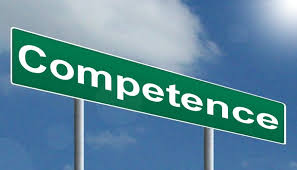
Even though there’s a number of skills involved with meditation, the most basic marker of successful meditation practice is the extent to which you can be continuously aware.
Meditation is a skill like any other skill. Just like most kids who first try and ride a bicycle aren’t very good at it, so too are most people who start meditating not very good. However, with time and diligence, a person gets increasingly proficient.
In educational circles, there’s this thing called competence theory, which does an excellent job of describing the stages of skill acquisition. Here’s the four stages and what they’d look like for the most basic meditation skill.
1) Unconscious Incompetency
Most people who’ve never engaged in body or awareness practices are at this stage. They don’t really understand the difference between present moment awareness and non-present moment awareness.
When they start meditating, they either don’t get what they’re supposed to do (pay attention to my body sensations? Huh?), or they just sit quietly ruminating and think they’re actually meditating. Generally, they have no idea how scattered their minds are or how much they’re enslaved to their impulses and emotions.
2) Conscious Incompetency
It’s always an exciting moment when a new meditator realizes just how constantly they’re lost in thinking. They usually feel pretty deflated, thinking they’re a bad meditator, but actually this marks a powerful step into stage two where awareness has become strong enough to notice what’s always been happening anyway.
As exciting as it may be, it still can feel very frustrating, because as much as they now see they’re ruled by anxiety, restlessness, lethargy, distracting impulses and thoughts, they can’t seem to get out of them.
A meditator partly breaks free from this stage through perseverance, but also partly through an investigative spirit. I found it very helpful to study my incompetency. What exactly was happening when I “blanked out?” How long was each instance of non-awareness? In which situations did it happen more and less?
3) Conscious Competence
At this stage, a meditator is able to stay highly aware, but it takes a fair amount of focus. Generally, this starts with being able to stay aware doing sitting meditation, potentially with the aid of a specific meditation object.
If a meditator sets the intention, they can generally also bring this steady awareness to simple, everyday tasks like washing the dishes, showering or driving.
This is a very relieving stage to be at as the whole process is a bit demystified. A meditator knows what to do. All that’s left is logging enough hours. Nonetheless, the amount of work needed to get solidly into the next stage often leaves people here for many years, decades or the rest of their meditation career.
4) Unconscious Competence
This is point where awareness becomes second nature—it’s no longer necessary to try or to think about how to meditate. It just sort of happens all by itself, as if the mind has been re-wired to awareness.
Even this stage has a couple of levels to it.
The first level is being able to get there sometimes, like when a meditator is a few days into retreat and suddenly they don’t have to try anymore—they’re always aware. However, they’ll know it’s the first level if they leave retreat and have to focus again.
The second level is what’s usually referred to as enlightenment, or stream-entry. It’s when a meditator goes so deep that the mind has permanently changed, and no matter what happens after, they never really have to try to be aware anymore. It’s just always present.
